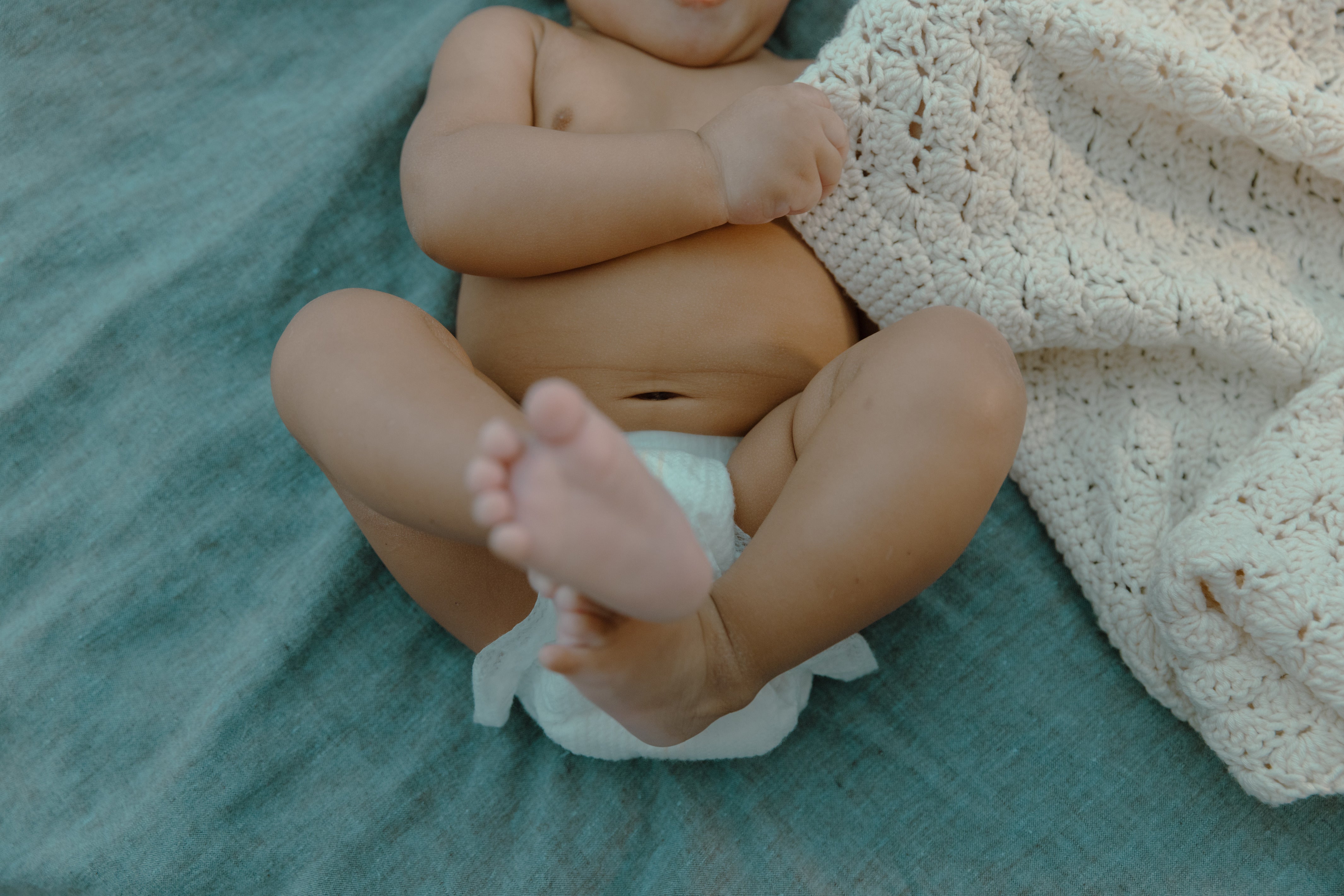A dry diaper in the morning may indicate reduced fluid intake or deeper sleep. Monitor hydration and consider consulting a pediatrician.
A dry diaper in the morning can cause concern for new parents. It’s essential to understand that occasional dry mornings might not be alarming. Babies’ fluid intake can vary, and deeper sleep can reduce nighttime urination. Ensure your baby is hydrated throughout the day.
Observe for other signs like reduced wet diapers during the day or changes in feeding habits. Consistent patterns or additional symptoms might require a pediatrician’s advice. Parents should keep track of their baby’s overall health and maintain a balanced diet. Proper hydration and regular check-ups ensure your baby’s wellbeing. Always trust your instincts and seek professional guidance if needed.

Credit: www.ebay.com
Common Causes
Worried that your baby’s diaper is not wet in the morning? There are several common causes behind this. Understanding these can ease your worries and help you take appropriate action.
Dehydration
Dehydration can be a major cause. Babies need sufficient fluids to produce urine. If your baby is not drinking enough, their diaper may stay dry.
- Make sure your baby gets enough breast milk or formula.
- Look for other signs of dehydration like dry mouth or sunken eyes.
- Consult your pediatrician if you suspect dehydration.
Sleeping Through The Night
Babies who are sleeping through the night may have dry diapers in the morning. This is generally normal as their bladder control improves.
- Track your baby’s sleep patterns.
- Note any changes in feeding times and amounts.
- Keep an eye on daytime wet diapers to ensure hydration.
Dehydration Indicators
Babies may sometimes wake up with dry diapers in the morning. It’s important to recognize the signs of dehydration to ensure your baby stays healthy. Here are some key dehydration indicators to watch for in your baby.
Dry Lips
One of the earliest signs of dehydration is dry lips. Healthy babies usually have moist and soft lips. If you notice your baby’s lips are dry or cracked, it might be a sign of dehydration.
| Normal | Dehydrated |
|---|---|
| Moist Lips | Dry or Cracked Lips |
Sunken Fontanel
The fontanel is the soft spot on your baby’s head. It usually looks slightly curved outward. If the fontanel appears sunken, it might indicate dehydration.
- Normal Fontanel: Slightly curved out
- Sunken Fontanel: Noticeably inward
Always keep an eye on these signs to ensure your baby is hydrated. If you notice any of these indicators, it’s important to consult with your pediatrician promptly.
Sleep Patterns
Understanding your baby’s sleep patterns is crucial. Babies often have varying sleep cycles. These patterns impact their bladder control, especially overnight. Let’s explore the connection between extended sleep and dry diapers.
Extended Sleep Cycles
Babies sometimes sleep for longer periods at night. This is known as extended sleep cycles. A longer sleep cycle means fewer awakenings. During these extended periods, babies may not wet their diapers as often. This can lead to a dry diaper in the morning.
Extended sleep is a sign of growing and developing sleep habits. It shows that your baby is learning to sleep through the night. This development is a positive milestone for both baby and parents.
Impact On Bladder Control
Extended sleep cycles also affect bladder control. Babies who sleep longer can hold their urine for extended periods. This improved bladder control results in dry diapers in the morning.
As babies grow, their bladder capacity increases. They can hold more urine without the need to void during sleep. This development is normal and indicates healthy growth.
Here is a simple table to summarize the key points:
| Aspect | Details |
|---|---|
| Extended Sleep Cycles | Longer sleep periods, fewer awakenings |
| Bladder Control | Improved holding capacity, less frequent urination |
Parents may notice that their baby’s diaper is not wet in the morning. This is a sign of developing sleep and bladder control.

Credit: growinghealthyhomes.com
Fluid Intake
Understanding your baby’s fluid intake is crucial for their health. The amount of fluids they consume affects their diaper wetness. Ensuring they drink enough water helps maintain their hydration levels. This section covers evening hydration and balanced daytime fluids to help you manage this better.
Evening Hydration
Evening hydration plays a key role in your baby’s diaper wetness. Limiting fluids before bedtime can reduce nighttime urination. Offer your baby more water during the day. This can help them stay hydrated without needing too much at night.
Below is a simple table to guide evening hydration:
| Time | Fluid Intake |
|---|---|
| 6:00 PM | Small sips of water |
| 7:00 PM | Milk or formula (if needed) |
| 8:00 PM | No fluids |
Balanced Daytime Fluids
Balanced daytime fluids help keep your baby hydrated all day. Ensure they drink water regularly. This can be done through a mix of breast milk, formula, and water.
Here’s a simple guide to balance daytime fluids:
- Offer water every hour.
- Provide milk or formula during meals.
- Include water-rich foods like fruits.
Keeping track of fluid intake during the day can help. This ensures your baby gets enough hydration without overloading at night.
Dietary Factors
Understanding why your baby’s diaper isn’t wet in the morning can be confusing. One key factor to consider is their diet. What your baby eats and drinks can significantly impact their urination patterns.
Solid Foods
As babies start eating solid foods, their urine output may change. Solid foods typically contain less water compared to breast milk or formula. This can lead to less frequent urination. Foods like cereals, pureed vegetables, and meats absorb more water during digestion. This means less water is available for urine production.
| Food Type | Water Content |
|---|---|
| Breast Milk | 88% |
| Formula | 85% |
| Pureed Vegetables | 70% |
| Cereals | 30% |
Breastfeeding Vs. Formula
Whether your baby is breastfed or formula-fed can also affect their urine output. Breast milk contains a higher water content compared to formula. This means breastfed babies may urinate more frequently.
- Breast milk: Higher water content
- Formula: Lower water content
If you recently switched from breastfeeding to formula feeding, your baby’s urination patterns might change. Formula-fed babies may have fewer wet diapers in the morning. Always ensure your baby is well-hydrated regardless of the feeding method.
Medical Conditions
Babies not having wet diapers in the morning can be concerning. It’s crucial to understand potential medical conditions causing this. Early detection can help manage these conditions effectively.
Urinary Tract Infections
Urinary Tract Infections (UTIs) in babies can lead to fewer wet diapers. UTIs can cause pain and discomfort during urination. This may result in the baby holding their urine for longer periods.
Signs of UTIs in babies include:
- Fever
- Fussiness
- Cloudy or strong-smelling urine
If you suspect a UTI, consult a pediatrician. Prompt treatment can prevent complications. Antibiotics are usually prescribed to treat UTIs.
Diabetes Insipidus
Diabetes Insipidus is a rare condition affecting water balance in the body. Babies with this condition may not produce enough wet diapers.
Symptoms of Diabetes Insipidus include:
- Excessive thirst
- Frequent urination
- Dehydration
Diagnosis involves blood and urine tests. Treatment typically includes hormone replacement therapy. Consult a doctor if your baby shows these symptoms.
When To See A Doctor
Babies often have wet diapers in the morning. If your baby’s diaper is dry, it could be a sign of a problem. Knowing when to see a doctor is important for your baby’s health.
Warning Signs
If your baby shows any of the following warning signs, consult a doctor:
- Dry diaper for more than 8 hours
- Dark yellow urine
- Fever
- Vomiting
- Poor feeding
- Unusual fussiness
A dry diaper combined with these symptoms might indicate dehydration or an infection.
Professional Diagnosis
A doctor can provide a professional diagnosis. They will examine your baby and ask about their habits. This might include:
| Examination | Description |
|---|---|
| Urine Test | Checks for infection or other issues |
| Physical Exam | Looks for signs of dehydration |
| Medical History | Reviews past health concerns |
Early detection is key. A doctor’s visit ensures your baby receives the best care.
Practical Solutions
Noticing your baby’s diaper is dry in the morning can be worrying. Let’s explore practical solutions to ensure your baby stays hydrated and healthy.
Adjusting Fluid Intake
Adjust your baby’s fluid intake during the day. Ensure they drink enough water and milk. Offer small amounts of water between feedings. Monitor the quantity of fluids given, especially before bedtime. You can keep a record of daily fluid intake using a simple table.
| Time | Fluid Type | Quantity |
|---|---|---|
| 8:00 AM | Milk | 150 ml |
| 11:00 AM | Water | 50 ml |
| 2:00 PM | Juice | 100 ml |
| 5:00 PM | Milk | 150 ml |
| 8:00 PM | Water | 50 ml |
Monitoring Sleep
Monitor your baby’s sleep patterns. Ensure they get enough sleep. A good night’s sleep helps with overall health. Create a consistent bedtime routine. This can include activities like:
- Bath time
- Story time
- Singing lullabies
Track any changes in their sleep duration. You can use a simple sleep log for this purpose.
- Note the time your baby falls asleep.
- Record any nighttime awakenings.
- Log the time they wake up in the morning.

Credit: www.nanit.com
Frequently Asked Questions
Why Is My Baby’s Diaper Dry In The Morning?
A dry diaper in the morning can be normal. Babies may not urinate frequently at night. Monitor for other signs of dehydration.
Should I Be Worried If The Diaper Is Not Wet?
Not necessarily. Check for other dehydration signs like dry mouth or fewer wet diapers throughout the day.
How Often Should A Baby Urinate At Night?
Babies typically urinate less at night. It varies with age and feeding patterns.
What Are Signs Of Dehydration In Babies?
Signs include dry mouth, few tears when crying, and fewer wet diapers. Consult a pediatrician if concerned.
Conclusion
Waking up to a dry diaper can be a relief. Always monitor your baby’s hydration and diaper habits. If concerns persist, consult your pediatrician. Ensuring your baby’s health and comfort is essential. Stay informed and proactive for your baby’s well-being.




